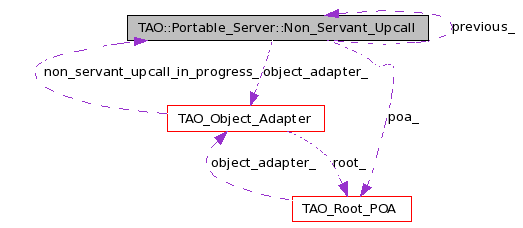
#include <Non_Servant_Upcall.h>
Collaboration diagram for TAO::Portable_Server::Non_Servant_Upcall:

Public Member Functions | |
| Non_Servant_Upcall (::TAO_Root_POA &poa) | |
| Constructor. | |
| ~Non_Servant_Upcall (void) | |
| Destructor. | |
| ::TAO_Root_POA & | poa (void) const |
Protected Attributes | |
| TAO_Object_Adapter & | object_adapter_ |
| TAO_Root_POA & | poa_ |
| Non_Servant_Upcall * | previous_ |
Definition at line 50 of file Non_Servant_Upcall.h.
| TAO::Portable_Server::Non_Servant_Upcall::Non_Servant_Upcall | ( | ::TAO_Root_POA & | poa | ) |
Constructor.
Definition at line 21 of file Non_Servant_Upcall.cpp.
References ACE_ASSERT, TAO_Object_Adapter::lock(), TAO_Object_Adapter::non_servant_upcall_in_progress_, TAO_Object_Adapter::non_servant_upcall_nesting_level_, TAO_Object_Adapter::non_servant_upcall_thread_, object_adapter_, previous_, ACE_Lock::release(), ACE_OS::thr_equal(), and ACE_OS::thr_self().
00022 : object_adapter_ (poa.object_adapter ()), 00023 poa_ (poa), 00024 previous_ (0) 00025 { 00026 // Check if this is a nested non_servant_upcall. 00027 if (this->object_adapter_.non_servant_upcall_nesting_level_ != 0) 00028 { 00029 // Remember previous instance of non_servant_upcall. 00030 this->previous_ = 00031 this->object_adapter_.non_servant_upcall_in_progress_; 00032 00033 // Assert that the thread is the same as the one before. 00034 ACE_ASSERT (ACE_OS::thr_equal ( 00035 this->object_adapter_.non_servant_upcall_thread_, 00036 ACE_OS::thr_self ())); 00037 } 00038 00039 // Remember which thread is calling the adapter activators. 00040 this->object_adapter_.non_servant_upcall_thread_ = ACE_OS::thr_self (); 00041 00042 // Mark the fact that a non-servant upcall is in progress. 00043 this->object_adapter_.non_servant_upcall_in_progress_ = this; 00044 00045 // Adjust the nesting level. 00046 this->object_adapter_.non_servant_upcall_nesting_level_++; 00047 00048 // We always release 00049 this->object_adapter_.lock ().release (); 00050 }
| TAO::Portable_Server::Non_Servant_Upcall::~Non_Servant_Upcall | ( | void | ) |
Destructor.
Definition at line 52 of file Non_Servant_Upcall.cpp.
References ACE_Lock::acquire(), TAO_Object_Adapter::lock(), TAO_Object_Adapter::non_servant_upcall_condition_, TAO_Object_Adapter::non_servant_upcall_in_progress_, TAO_Object_Adapter::non_servant_upcall_nesting_level_, TAO_Object_Adapter::non_servant_upcall_thread_, ACE_OS::NULL_thread, object_adapter_, TAO_Root_POA::outstanding_requests(), poa_, and previous_.
00053 { 00054 // Reacquire the Object Adapter lock. 00055 this->object_adapter_.lock ().acquire (); 00056 00057 // Adjust the nesting level. 00058 this->object_adapter_.non_servant_upcall_nesting_level_--; 00059 00060 // We are done with this nested upcall. 00061 this->object_adapter_.non_servant_upcall_in_progress_ = this->previous_; 00062 00063 // If we are at the outer nested upcall. 00064 if (this->object_adapter_.non_servant_upcall_nesting_level_ == 0) 00065 { 00066 // Reset thread id. 00067 this->object_adapter_.non_servant_upcall_thread_ = 00068 ACE_OS::NULL_thread; 00069 00070 // Check if all pending requests are over. 00071 if (this->poa_.waiting_destruction () && 00072 this->poa_.outstanding_requests () == 0) 00073 { 00074 try 00075 { 00076 this->poa_.complete_destruction_i (); 00077 } 00078 catch (const::CORBA::Exception&ex) 00079 { 00080 // Ignore exceptions 00081 ex._tao_print_exception ("TAO_POA::complete_destruction_i"); 00082 } 00083 } 00084 00085 // If locking is enabled. 00086 if (this->object_adapter_.enable_locking_) 00087 // Wakeup all waiting threads. 00088 this->object_adapter_.non_servant_upcall_condition_.broadcast (); 00089 } 00090 }
| ACE_INLINE::TAO_Root_POA & TAO::Portable_Server::Non_Servant_Upcall::poa | ( | void | ) | const |
Definition at line 12 of file Non_Servant_Upcall.inl.
References poa_.
Referenced by TAO_Root_POA::destroy_i().
00013 { 00014 return this->poa_; 00015 }
Definition at line 64 of file Non_Servant_Upcall.h.
Referenced by Non_Servant_Upcall(), and ~Non_Servant_Upcall().
Definition at line 66 of file Non_Servant_Upcall.h.
Referenced by Non_Servant_Upcall(), and ~Non_Servant_Upcall().
 1.4.7
1.4.7